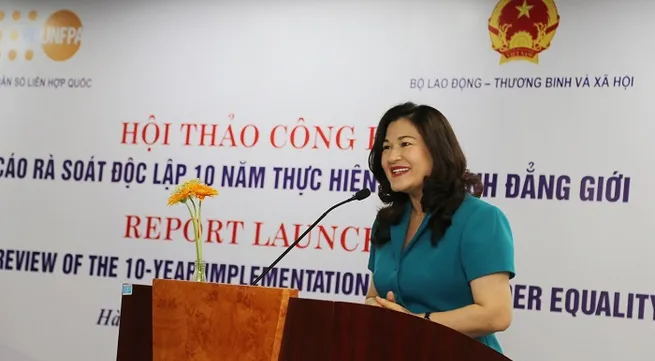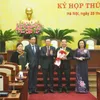Vietnam’s gender equality work drives initial positive changes: Deputy Minister

Ha, who also serves as Standing Vice Chairwoman of the National Committee for the Advancement of Women in Vietnam, made the remark at a seminar which was jointly held by the ministry (MOLISA) and the United Nations Population Fund (UNFPA) in Vietnam on September 24 to announce an independent review report on the 10-year implementation of the country’s Law on Gender Equality.
The improvement of some development indicators has helped Vietnam climb higher in the rankings while winning high appreciation from the international community for its efforts to implement gender equality, she said.
Vietnam is a signatory to several international instruments addressing gender equality, women empowerment. In 2006, the country promulgated the Law on Gender Equality which mandates Government bodies and the People’s Committees at all levels to fulfil their responsibilities in state management on gender equality.
Under the direction of the Prime Minister, in 2018, the MOLISA devised a report reviewing the 10-year implementation of the Law based on the synthesis of reports from ministries, sectors and localities, and organised a review conference in October 2019. The UNFPA provided financial and technical support for the MOLISA during the process of building the report from early 2018 to June 2019. The report focused on assessing the Law’s consistency in relation to international human rights standards and other Vietnamese laws, and the effectiveness of the implementation of the Law by duty bearers for the period 2007-2019. It also clarified achievements and shortcomings, thence proposing recommendations regarding the revision of the Law and ensuring better implementation.
Ha emphasised that the independent review report has been completed with valuable inputs and comments in the context that the Law on Gender Equality should be reviewed and revised in the coming time.
Vietnam is facing new challenges in gender equality due to the impacts of the global economy, the strong development of the Fourth Industrial Revolution, natural disasters and climate change, and demographic changes. These challenges require the country to develop specific policies and actions to maintain achievements and simultaneously address existing gender issues as well as emerging gender issues in the upcoming period. This effort demonstrates Vietnam’s continued strong commitment to achieving the Sustainable Development Goal (SDG) 5 on gender equality and women empowerment.
Speaking at the seminar, UNFPA Representative in Vietnam Naomi Kitahara emphasised that Vietnam has become one of the countries in the Asia-Pacific region with significant progress in gender equality. The country has attained remarkable achievements with regards to the promotion of women’s rights and leadership, notably in health and education, by strengthening legal and institutional frameworks.
As one of the 17 SDGs, gender equality and empowerment of women are indispensable for all aspects of people’s socio-economic lives. Gender equality is not only a basic human-right, but also a necessary foundation for a peaceful and prosperous Vietnam. Without addressing the issue of gender equality there is no way that Vietnam can achieve SDGs by 2030, Kitahara added.
At the seminar, leaders of MOLISA and UNFPA called for more joint efforts from Government ministries and organisations, civil society, the private sector, and UN agencies in accelerating progress towards sustainable development by 2030, leaving no one behind.
Tags:





